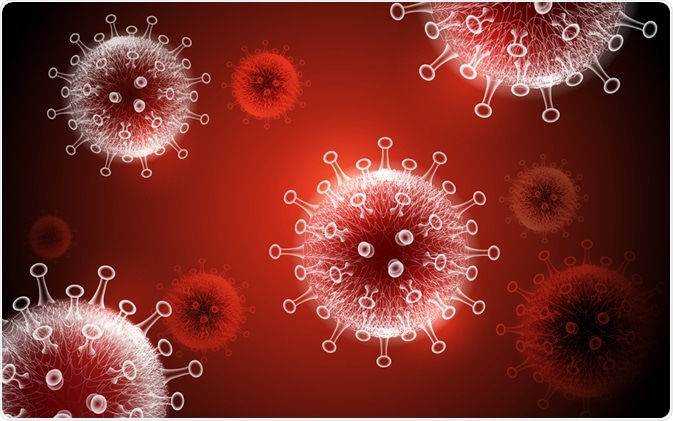Scientists believe that understanding the functional characteristics of antibodies against severe acute respiratory syndrome coronavirus-2 (SARS-CoV-2) spike (S) protein might help predict the disease outcome, i.e., how severely an individual might get infected.
SARS-CoV-2 is a positive-stranded RNA virus that has caused the coronavirus disease 2019 (COVID-19) pandemic. In general, the main function of antibodies is to neutralize and eliminate the virus from the human body. This article discusses the role of antibodies to prevent and cure COVID-19.

COVID-19. Image Credit: CKA/Shutterstock.com
Antibody Response to COVID-19
Antibodies that work against enveloped viruses (e.g., SARS-CoV-2) are immunoglobulin (Ig) M, IgG (IgG3 and IgG1), and IgA antibodies to glycoproteins and nucleoproteins (NP) of the viruses’ envelope. Neutralization of virus occurs when Fab regions of the antibody bind to viral antigens, which inhibits the virus from binding to host cell receptors.
Further, antiviral effector cells are activated by the binding of antibody Fc regions to Fcγ receptors on Natural Killer (NK) cells. This triggers the antibody-dependent cellular cytotoxicity of virus-infected cells which promote opsonophagocytosis of virus particles. Additionally, even though antibodies to the SARS-CoV-2 NP are regarded as a valuable serological marker of infection, their role in preventing virus replication has not been clearly understood.
Even though antibodies typically neutralize and eliminate SARS-CoV-2 from the host cell, they can sometimes enhance the inflammatory response through antibody-dependent enhancement (ADE).
Detection and Analysis of Antibodies in COVID-19 Patients
Researchers have reported that 14 days post the onset of COVID-19 symptoms, the serum of infected patients contains IgM and/or IgG antibodies against the S protein of the SARS-CoV-2, and antibodies against the receptor-binding domain (RBD) of the S protein. The presence of these antibodies strongly correlates with antibodies that neutralize viral replication in cell cultures.
Scientists further observed that in severely infected patients, the presence of IgG antibodies was found to be more than other types of antibodies. However, more research is required to understand the role of IgG antibodies against SARS-CoV-2 S protein in controlling infection and disease pathogenesis.
In a macaque model of SARS-CoV-1 infection, researchers have analyzed the serum and found the presence of IgG antibodies against SARS-CoV-1 S protein which correlates with severe lung injury. This is owing to the activation of macrophage and its skewing towards a pro-inflammatory M1phenotype.
The tissue infiltration caused by macrophages and neutrophils and enhancement in the production of pro-inflammatory cytokines and chemokines contributes to the pulmonary immunopathology in the macaque. Similarly, in a mice model, researchers have reported that the production of antibodies against SARS-CoV-1 S protein was strongly connected with the occurrence of pulmonary immunopathology.
The Role of Neutralizing Monoclonal Antibodies (mAbs) in Containing COVID-19
Neutralizing mAbs are proteins that have been derived from the B cells of COVID-19 patients. Antibodies are screened and isolated from the plasma of a COVID-19 recovered patient. Subsequently, specific antibodies are engineered and produced in huge batches as mAbs. Such mass production of effective antibodies enables it to be readily available for the treatment of infected individuals.
Neutralizing mAbs have been used as an antiviral medicine for the treatment of COVID-19 symptoms. In some instances, mAbs have also been used to prevent infection. However, there are certain advantages and disadvantages of this method of treatment. According to Professor Peter Taylor of NDORMS, mAb therapies have been already assessed for several diseases such as Respiratory Syncytial Virus (RSV) and Ebola.
Three mAb therapies have received emergency authorization (EUA) for the treatment of COVID-19 in the US. He further added that neutralizing mAbs, in combination with other medications, could effectively prevent as well as cure COVID-19 patients.
What Levels of Antibodies Could Prevent Reinfection with SARS-CoV-2?
A team of researchers led by Dr. Dan Barouch of Beth Israel Deaconess Medical Center studied the levels of antibodies and immune cells required to prevent reinfection with the COVID-19 virus. They used monkeys called rhesus macaques for this study, which were exposed to SARS-CoV-2. Antibodies were collected from these monkeys and injected into monkeys unexposed to COVID-19. These monkeys were found to be protected when they were later exposed to the virus.
The levels of protection correlated with the amount of antibodies injected. In all the monkeys which received the highest dose, no virus was detected in either the lungs or noses, after being exposed to the disease. The monkeys that received medium doses were also protected.
However, those that received low doses developed an infection. Interestingly, the duration of COVID-19 disease in these monkeys was significantly shorter than monkeys that were not given any antibodies before exposing them to SARS-CoV-2. This study revealed that the highest dose is most effective in protecting individuals from the disease and monkeys with active T cells successfully prevented reinfection. But, COVID-19 antibodies wane off after some time and, therefore, T cells are required for long-term protection from the virus.
Autoantibodies and COVID-19
Autoantibodies are defined as rogue antibodies that attack either elements of the body’s immune system or specific proteins in organs (e.g., heart). Researchers believe that, unlike cytokine storms that cause systemic and short-duration problems, autoantibodies result in long-term damage.
Several theories have emerged that explain the connection between autoantibodies and COVID-19 disease. One such theory stated that COVID-19 infections could stimulate the production of autoantibodies. A recent study showed 52% of 172 COVID-19 patients who required hospitalization had autoantibodies. These studies indicate the correlation between severe COVID-19 disease and autoantibodies.
Sources:
- French, A.M. (2020). The role of SARS-CoV-2 antibodies in COVID-19: Healing in most, harm at times. Respirology, 25, pp. 680-682.
- The role of mAbs (neutralizing monoclonal antibodies) in the fight against COVID-19. University of Oxford. (2021). [Online] Available at: www.ndorms.ox.ac.uk/.../the-role-of-mabs-neutralising-monoclonal-antibodies-in-the-fight-against-covid-19
- Reynolds, S. (2020). Antibodies and T cells protect against SARS-CoV-2. National Institute of Health. [Online] Available at: https://www.nih.gov/news-events/nih-research-matters/antibodies-t-cells-protect-against-sars-cov-2
Further Reading
Last Updated: Aug 11, 2021